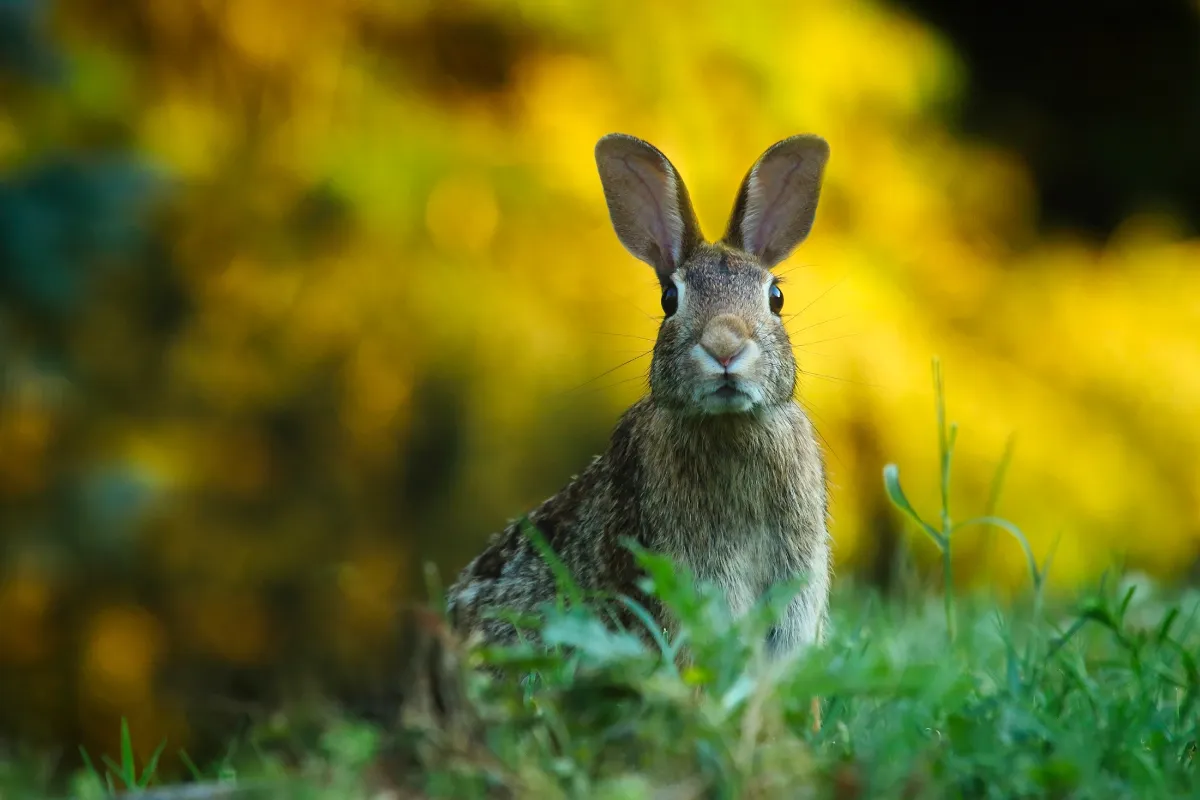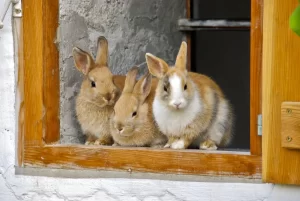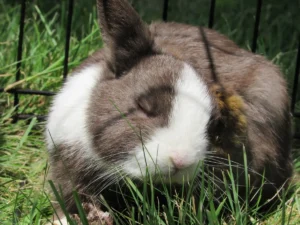Do you ever wonder just how intelligent rabbits really are? Well, get ready to be amazed as we delve into the fascinating world of rabbit intelligence.
From their problem-solving abilities to their social intelligence and communication skills, rabbits are much more than just adorable fluffy creatures.
In this article, we will explore the various aspects of rabbit intelligence, shedding light on their remarkable learning and adaptive abilities, as well as their impressive navigation and spatial awareness skills.
Prepare to see rabbits in a whole new light!
In This Article
- 1 Key Takeaways
- 2 Differentiating Instinct From Intelligence
- 3 Problem-Solving Abilities of Rabbits
- 4 Social Intelligence in Rabbit Communities
- 5 Learning and Adaptability in Rabbits
- 6 Navigation and Spatial Awareness Skills
- 7 Communication and Understanding in Rabbits
- 8 Frequently Asked Questions
- 8.1 What Are the Different Types of Instincts That Rabbits Possess?
- 8.2 Do Rabbits Have the Ability to Solve Complex Problems?
- 8.3 How Do Rabbits Interact With Others in Their Community?
- 8.4 Can Rabbits Learn New Skills or Adapt to Their Environment?
- 8.5 How Do Rabbits Navigate and Understand Their Surroundings?
- 9 Conclusion
Key Takeaways
- Rabbits exhibit both instinctual behavior and cognitive abilities, showcasing a combination of instinct and intelligence.
- Rabbits display problem-solving skills and adaptive intelligence, using tools, showing spatial awareness, and engaging in social problem-solving.
- Rabbit communities demonstrate remarkable social intelligence through cooperative behavior, empathy, and complex communication.
- Rabbits possess impressive learning, adaptability, and navigation skills, relying on memory, observation, and cues from their surroundings.
Differentiating Instinct From Intelligence
You should differentiate instinct from intelligence to better understand animal behavior.
Instinctual behavior refers to innate behaviors that animals are born with, such as a rabbit’s ability to hop or a bird’s ability to fly. These behaviors are automatic and don’t require conscious thought or decision-making.
On the other hand, intelligence refers to an animal’s cognitive abilities, such as problem-solving, learning, and memory.
When studying animal behavior, it’s important to consider both instinctual behavior and cognitive abilities. By doing so, we can gain a deeper understanding of how animals interact with their environment and make decisions based on their instincts and intelligence.
This knowledge can then be used to better serve animals, whether it be through creating enriching environments or developing training techniques that tap into their cognitive abilities.
Problem-Solving Abilities of Rabbits
The rabbits are known for their impressive problem-solving abilities, and they can often find creative solutions to overcome obstacles in their environment. Through their cognitive abilities, they exhibit intelligence in various ways:
- Tool Usage: Observations have shown that rabbits can manipulate objects in their surroundings to achieve their goals. They’ve been observed using twigs or rocks to dig burrows or access food sources.
- Spatial Awareness: Rabbits possess a keen sense of spatial awareness, allowing them to navigate complex environments with ease. They can accurately remember the location of food sources and shelter, enabling efficient foraging and survival.
- Social Problem Solving: Rabbits are highly social animals, and their problem-solving abilities extend to group dynamics. They can communicate and cooperate with other rabbits to overcome challenges, such as escaping predators or finding new territories.
These cognitive abilities in rabbits showcase their adaptive intelligence, enabling them to thrive and overcome challenges in their natural habitats.
Social Intelligence in Rabbit Communities
Rabbits in their communities display remarkable social intelligence, as they actively engage with one another to establish hierarchies and ensure overall group cohesion. Cooperative behavior is a key aspect of rabbit communities, as they work together to forage for food, protect each other from predators, and care for their young.
These cooperative behaviors are evidence of their emotional intelligence in social interactions. Rabbits exhibit empathy towards each other, comforting and grooming those in distress. They also engage in complex communication through various vocalizations and body language, allowing them to convey information and establish social bonds.
Through their social interactions, rabbits demonstrate an understanding of the needs and emotions of their fellow community members, contributing to the overall well-being and success of the group.
Learning and Adaptability in Rabbits
Don’t underestimate the ability of rabbits to learn and adapt to new environments. These fluffy creatures may seem simple, but they possess remarkable intelligence. Here are some fascinating insights into their learning and adaptability:
- Memory retention in rabbits: Rabbits have an impressive capacity for memory retention. They can recall specific locations, recognize familiar individuals, and remember learned behaviors for extended periods.
- Learning through observation in rabbits: Rabbits are keen observers and can learn by watching others. They pick up on cues from their surroundings and fellow rabbits, enabling them to acquire new skills and behaviors.
- Adaptability in rabbits: Despite their small size, rabbits display remarkable adaptability. They can adjust their behavior and habits to suit different environments, whether it’s finding new food sources or creating safe burrows.
Can you navigate through the maze using your spatial awareness skills?
When it comes to rabbits, their ability to navigate and have a sense of direction has been a topic of interest. Research has shown that rabbits possess impressive memory and recall abilities, allowing them to remember and locate specific locations within their environment.
Their spatial awareness skills are particularly evident when they navigate through complex mazes to find food or escape from predators. Scientists have observed that rabbits rely on various cues, such as landmarks and scent trails, to orient themselves and navigate their surroundings.
Their keen sense of direction is likely a result of a combination of innate instincts and learned experiences. Understanding the navigational skills of rabbits can’t only provide insights into their cognitive abilities but also help us develop strategies to better serve and care for these intelligent creatures.
Communication and Understanding in Rabbits
You should try using positive reinforcement and treats to strengthen your bond and improve your understanding of a rabbit’s communication cues. Understanding vocalizations and signaling in rabbits is essential for effective communication.
Here are some important cues to consider:
- Vocalizations: Rabbits use various sounds to communicate their emotions and needs. For example:
- Soft purring indicates contentment.
- Growling or grunting signifies aggression or frustration.
- Loud screams suggest pain or fear.
- Body Language: Pay attention to your rabbit’s posture and movements, as these can convey important messages. For instance:
- Ears held upright indicate curiosity or alertness.
- A thumping hind leg signifies danger or warning.
- A relaxed, stretched-out body demonstrates comfort and trust.
- Scent Marking: Rabbits use scent to communicate territorial boundaries and attract mates. They’ve scent glands on their chin, cheeks, and anal area, which they use to mark their environment.
Understanding nonverbal communication in rabbit pairs is crucial for maintaining harmony and preventing conflicts. By being attentive to their cues, you can build a stronger bond with your rabbits and ensure their well-being.
Frequently Asked Questions
What Are the Different Types of Instincts That Rabbits Possess?
Rabbits possess different types of instincts, such as survival and reproductive instincts. They communicate through body language and can sense direction and orientation. These observations suggest a level of intelligence in rabbits.
Do Rabbits Have the Ability to Solve Complex Problems?
Rabbits possess problem-solving capabilities and cognitive abilities that may surprise you. Their intelligence extends beyond their cute appearance. They can tackle complex problems with ease, proving that rabbits are smarter than you think.
How Do Rabbits Interact With Others in Their Community?
Rabbits communicate through various behaviors, such as thumping their hind legs or vocalizing. They establish a social hierarchy in their communities, where dominant rabbits have more access to resources.
Can Rabbits Learn New Skills or Adapt to Their Environment?
Rabbits have impressive cognitive abilities and a remarkable capacity for environmental adaptation. They can learn new skills and adapt to their surroundings, making them intelligent creatures that can thrive in various environments.
Rabbits navigate and understand their surroundings through their remarkable sensory abilities. They communicate using a combination of body language, scent marking, and vocalizations. It’s fascinating to observe how they interpret and respond to the world around them.
Conclusion
In conclusion, rabbits display remarkable intelligence in various aspects of their behavior. One fascinating statistic is that rabbits have been found to solve complex problems at a similar level as primates, showcasing their cognitive abilities.
Additionally, their social intelligence and communication skills contribute to their successful navigation and adaptation in their environments. This highlights the underestimated intelligence of rabbits and emphasizes the need for further research to fully understand their cognitive capabilities.





